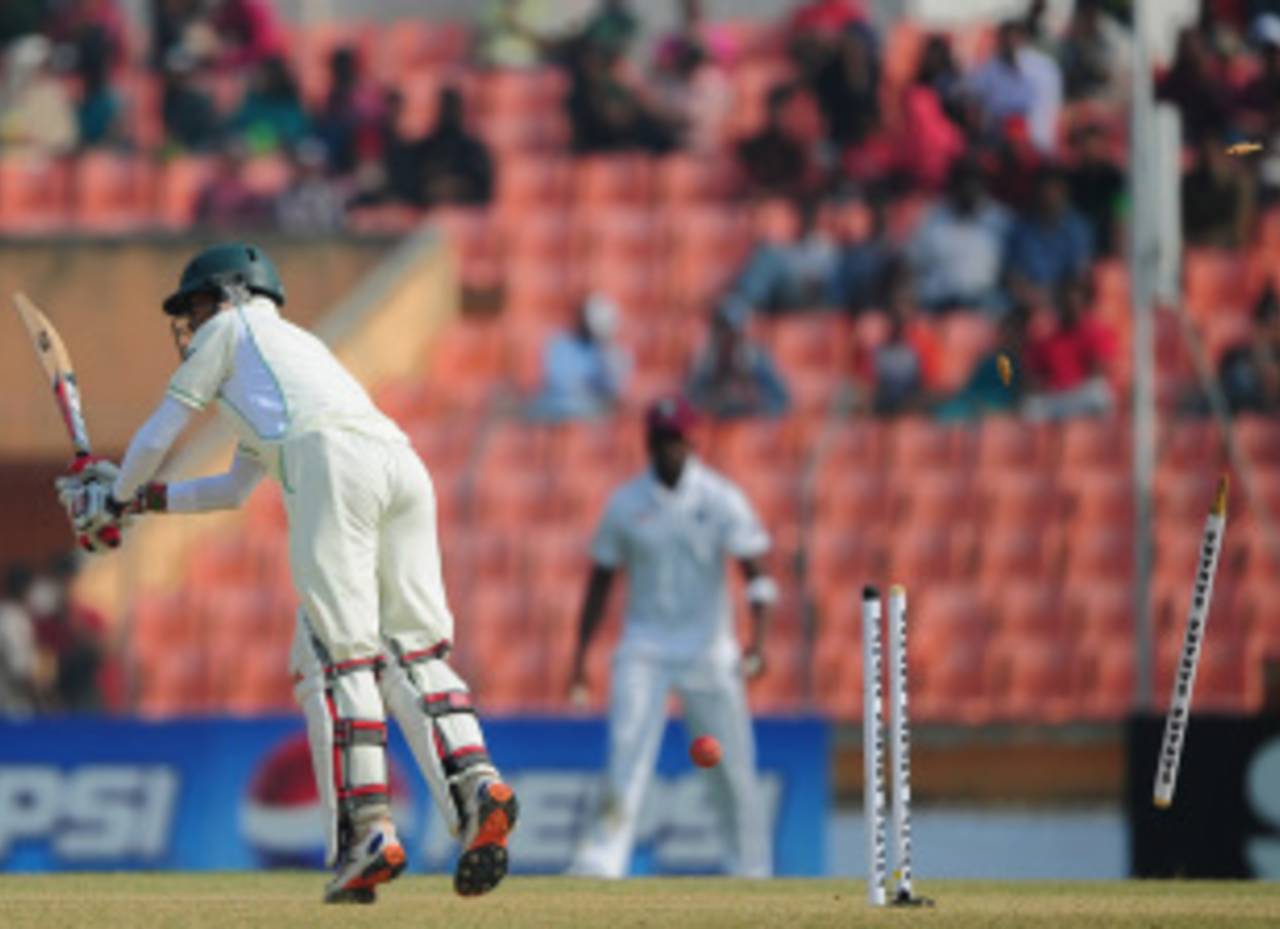Still plenty to learn for Bangladesh batsmen
Mohammad Isam in Khulna
25-Nov-2012

Nasir Hossain has to address the apparent mental barrier he faces when nearing a a hundred • AFP
Mushfiqur Rahim was running laps of the Sheikh Abu Naser Stadium when Darren Sammy spotted him while walking across from the media centre to the dressing-room. The West Indies captain saw the lighter side of it and even asked Mushfiqur a good-natured question about staying fit. But the sight of the Bangladesh captain, in his whites, running after a big Test loss was ominous. The Bangladesh players, particularly the batsmen, have issues to deal with but they don't seem to be doing it in the right way.
Known to be one of those cricketers who goes through a period of sulking after a poor performance and has a hard time moving on, Mushfiqur could afford some down time when he was just a regular member of the side. But this characteristic becomes a bigger disadvantage when he is the captain, as those who had followed his progress from his formative years pointed out when he was named captain last year. In this series he aggregated a modest 107 and had no business being dismissed the way he was in the second innings in Khulna, so a share of the blame does lie with him, not just as captain but as batsman too. But if he lets this series loss play too relentlessly on his mind, it will not help him or his team much.
Instead, he and the rest of the line-up have to figure out ways to improve not just as batsmen but as thinking cricketers. There were positives with the bat in this series but those occurred mostly in the first innings of the first Test. Since then, it was mostly a story of fritting away advantages earned.
The concerns for Bangladesh start at the top, where Junaid Siddique and Nazimuddin tried out as Tamim Iqbal's partners. Both failed but Siddique, who was replaced by Nazimuddin for the second Test, could have been allowed second chance. Siddique had fought back similarly against England two years ago, after an early failure, and has first-class runs behind him. But the selectors don't seem to have taken note. Either way, both seemed unprepared for quick and short bowling, a standard requirement for opening batsmen.
Tamim too could learn from this Test series, as he continues to try to instill discipline in his batting. He was bowled twice in Khulna, once leaving and then surprised by pace, and was out to a rash shot in the first Test. He will have to work hard on balancing his impetuous strokeplay with the discipline he has talked about recently.
Bangladesh have also had trouble with the No.3 position in this series, which they could have avoided had Shahriar Nafees not committed to a shot-a-minute mantra. He was persisted with through this series and frustrated in all four innings. In Dhaka, he needlessly went after the bowling when Tamim was already doing that job in the first innings. He was dismissed twice to the short ball and, like Junaid, is struggling against deliveries pitched on that length.
Mahmudullah bats too low down the order; his maturity is an aspect that can be used to Bangladesh's advantage in the top or middle order
Someone who began the series with a refreshing approach was Naeem Islam, but after the century in Dhaka, he too has given it away much too easily. He has had footwork issues and, as the second innings dismissal in Khulna showed, Naeem also has to work on what to leave outside offstump without committing himself fully.
Among those who have done well consistently is Nasir Hossain, who scored three half-centuries in the series, but he too was out for just 21 at the most crucial stage of the first Test. He also gave it away after cruising to 52 in the first innings of the Khulna Test and, from a personal point of view, he has to address the apparent mental barrier he faces when nearing a a hundred; he has now fallen twice in the nineties and though the 96 and 94 are runs that had helped the team at the time, not getting hundreds will hinder his further progress. While he has injected some control into his strokeplay, his natural tendency to hit out requires a watchful eye from time to time.
Shakib Al Hasan also gave away two chances of scoring hundreds, an issue that has dogged him for most of his international career. He also has to learn be on top in crucial situations, especially when the team is nearing a win; he had done it successfully in Test cricket once, three years ago, and has done it quite regularly in one-day cricket.
Mahmudullah is one batsman who seemed to have grown during this Test series, particularly in the way he rallied after being was hit several times. He bats too low down the order; his maturity is an aspect that can be used to Bangladesh's advantage in the top or middle order.
What could help these batsmen develop further would be if there were six other batsmen pushing them continuously by performing in domestic cricket and for Bangladesh A. To Bangladesh's benefit, their first-class cricket this year has been competitive, which also means these Test batsmen have the opportunity to go back and play, and find out more about their batting. If they get the chance, they shouldn't think twice or hide behind an excuse. It doesn't pay as much or is not watched by thousands, but scoring runs just for the pleasure of it, without much scrutiny should be enough incentive to play in the National Cricket League.
Otherwise, in three months' time in Sri Lanka, much of these same words will be written, read and forgotten.
Mohammad Isam is ESPNcricinfo's correspondent in Bangladesh